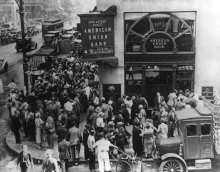Federal Writers' Project – Life Histories/2020/Fall/105/Section068/William Bagwell

Biography
[edit | edit source]Early Life
[edit | edit source]William Bagwell was born in Apex, NC around 1909. His parents were both well-educated. His father was self-taught and very educated. He was a man that strived to obtain knowledge in all areas. His mother held a college degree. His parents wanted him to become a lawyer and gain additional degrees and skills, yet he followed a different career path from what they had hoped and became a mechanic.
Family Life and Children
[edit | edit source]Bagwell had two children, a daughter, and a son with his wife, Marie. His daughter’s name was Beth and the son’s name was William Junior. Beth was a high school drop out and got pregnant around 16. Her parents didn’t approve and they hadn’t spoken since even after Beth got married. Jackson Junior went to college and wasn’t dependent on his family, he was against Beth dropping out of school. Research in Takashi Yamashita’s article, “The Effects of the Great Depression on Educational Attainment” found that the net effect of the Great Depression was to increase the average years of schooling, which is supported by William Jr’s determination to receive higher education. Bagwell belonged to the Baptist church and Marie was Presbyterian. Marie mentioned that Jackson and she drank excessively and their ties to religion faded after that began. She believed that children often follow the example set by parents and are a reflection of their parents so she didn’t blame Beth for anything that has happened.
Adult Life and Career
[edit | edit source]Bagwell was a mechanic. His son, William Jr went in a different direction than his father when he pursued higher education, just as Jackson went in a different direction from his own father. Bagwell found it very important to neat and clean, unlike some of the other mechanics he worked with. He held hygiene in high regard and related it to his dignity. Working in a time heavily influenced and weighed down by the impacts of the Great Depression, Bagwell made around one-hundred dollars a month. This wasn’t outstanding, but he always had a little extra income, yet he never saved it. This was consistently a topic of argument for Marie and Bagwell. The cost of living for two people at the time was $15 a month on rent, $12 on the car, and $6-7 for groceries. Jackson made $100 a month and mentioned that he often had around 65$ extra dollars, but never knew where they went. According to “Employment and Unemployment in the 1930s” by Margo Robert, “between 1929 and 1933 the unemployment rate increased by over 20 percentage points.”[1] This severely limited options for most people who wanted to receive more schooling or change career paths at the time. Bagwell towards the end of an interview mentioned that if he had more education, their lives would have been easier and he would have accomplished more.
Economic Problems of the 1930s
[edit | edit source]Jackson struggled with saving his money and accumulated debt like most people do today. Although he made enough money to put some aside, they didn’t have any savings. His wife, Marie, was often angry at him for this and worried about how and where they would live when Jackson retired. The educational levels he decided to attain and that he found fit were heavily influenced by the recovering economy after the Great Depression. The Great Depression was caused by the stock market crash of 1929 and a few other factors such as overproduction and the gold standard. It lasted from 1929 to 1933 in the United States. According to research by Margo Robert in the Journal of Economic Perspectives, between 1929 and 1940, annual changes in real wages and unemployment were positively correlated.[2] This, as mentioned earlier, further limited the options of most people seeking jobs and education. President Franklin D. Roosevelt responded to the depression with the implementation of the New Deal.
Legacy
[edit | edit source]Bagwell regretted not attaining and striving for higher education in his life. He never forgave Beth for becoming pregnant and Marie wished she had known her grandchild. Bagwell constantly whipped William Jr for standing up for his sister, and soon he stopped visiting his parents as well. With more education, Bagwell believed he could have been a better man with a better life.
Bibliography
[edit | edit source]Margo, Robert A. 1993. "Employment and Unemployment in the 1930s." Journal of Economic Perspectives, 7 (2): 41-59 DOI: 10.1257/jep.7.2.41
Davis-Kean, P. E. (2005). The Influence of Parent Education and Family Income on Child Achievement: The Indirect Role of Parental Expectations and the Home Environment. Journal of Family Psychology, 19(2), 294-304. doi:10.1037/0893-3200.19.2.29
Yamashita, Takashi. “The Effects of the Great Depression on Educational Attainment,” 2007 http://citeseerx.ist.psu.edu/viewdoc/download?doi=10.1.1.187.3666&rep=rep1&type=pdf
